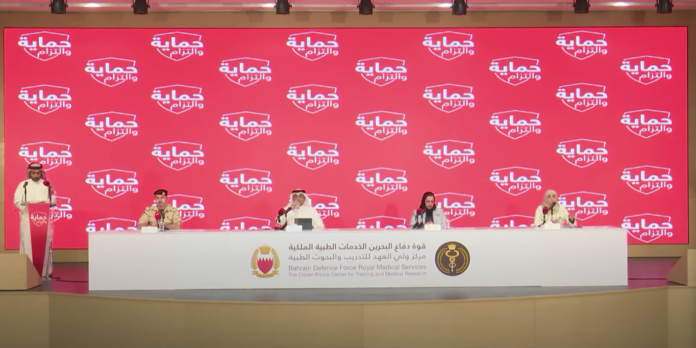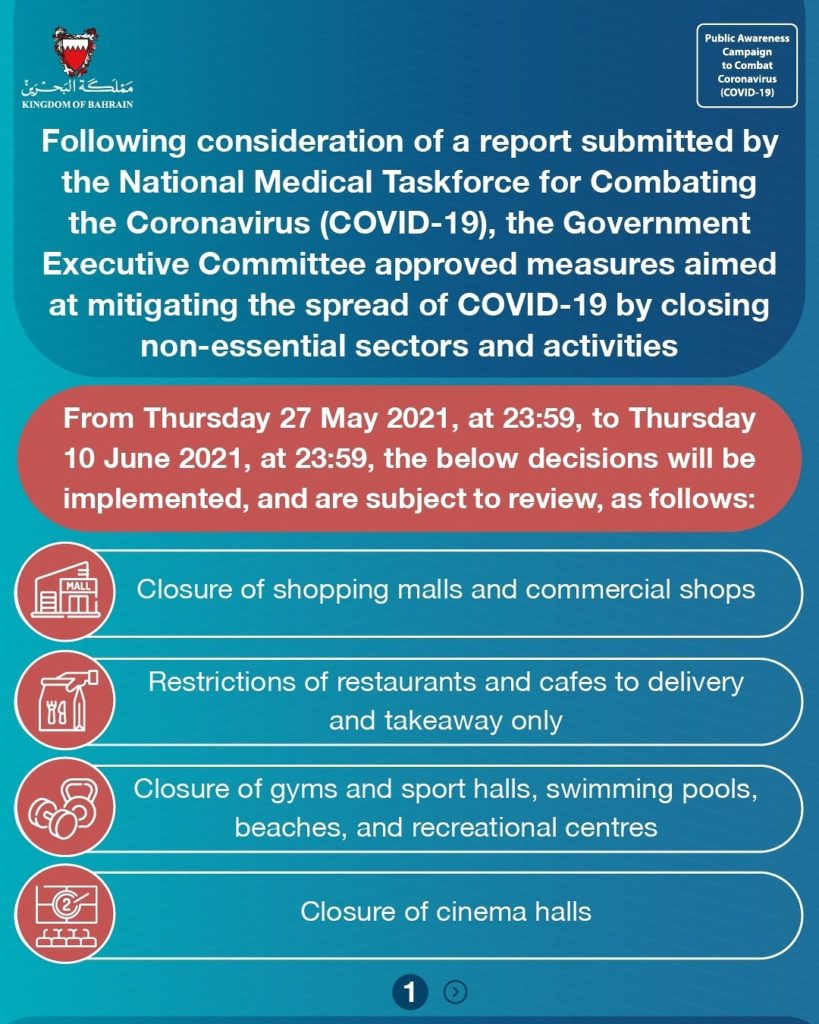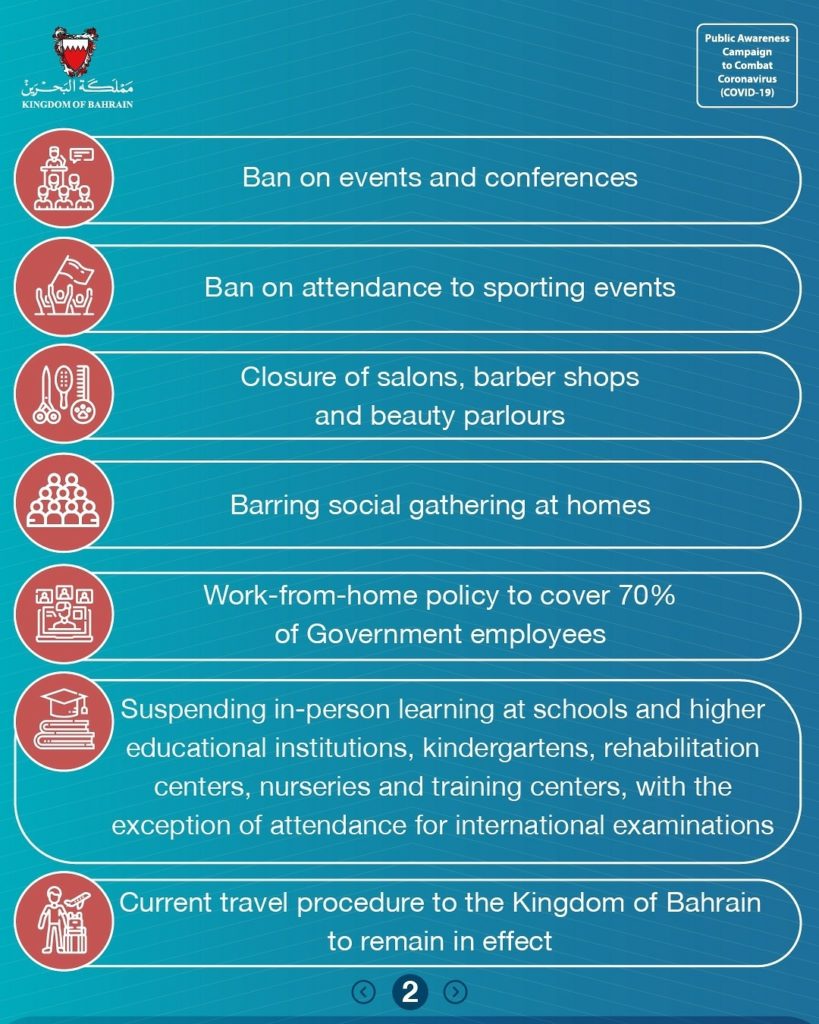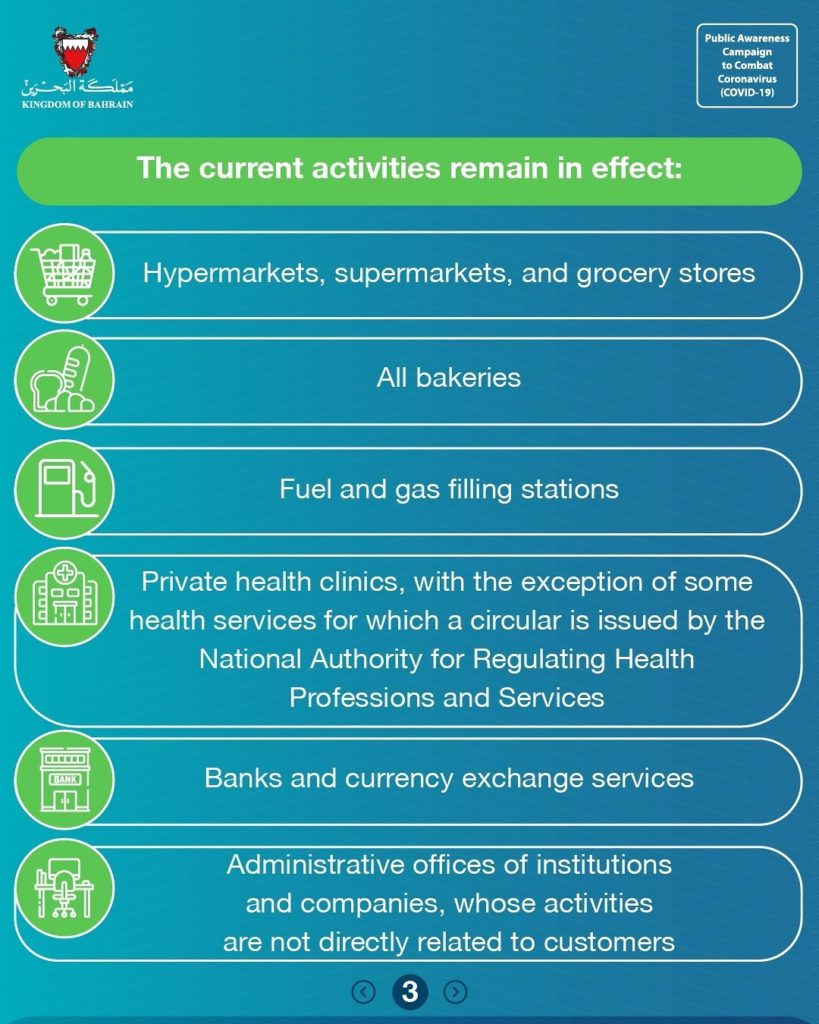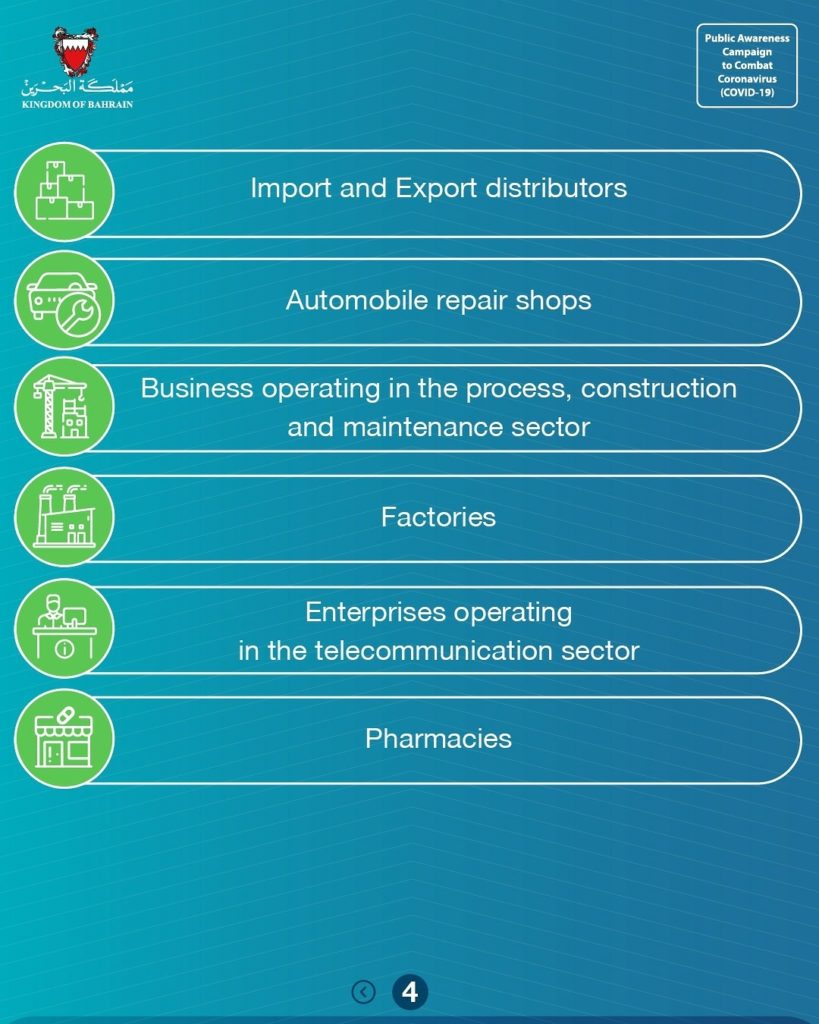The National Taskforce for Combating the Coronavirus (COVID-19) held a press conference at the Crown Prince Centre for Training and Medical Research at the Bahrain Defence Force Hospital to highlight efforts made to contain COVID-19, and announce new measures to ensure the prevention of its spread.
During the press conference, the National Taskforce for Combating the Coronavirus (COVID-19) today announced new COVID-19 related measures that take effect from 23.59hrs 27 May 2021 to 23.59hrs 10 June 2021 following approval from the Government Executive Committee:
Decisions undertaken:
- Closure of malls and commercial shops
- Closure of restaurants and cafes except for delivery and takeaway services only
- Closure of gyms and sport halls, swimming pools, beaches, and recreational centres
- Closure of cinemas
- Ban on events and conferences
- Ban on attending sporting events
- Closure of salons, barber shops and beauty parlours
- Barring social gatherings in homes
- Work-from-home policy to cover 70% of Government employees
- Suspending in-person learning at schools and higher educational institutions, kindergartens, rehabilitation centers, nurseries and training centers, with the exception of attendance for international examinations
- Current travel procedures to the Kingdom of Bahrain to remain in effect
The current activities remain in effect:
- Hypermarkets, supermarkets, and grocery stores
- All bakeries
- Fuel and gas filling stations
- Private health clinics, with the exception of some health services for which a circular is being issued by the National Authority for Regulating Health Professions and Services
- Banks and currency exchange services
- Administrative offices of institutions and companies, whose activities are not directly customer facing
- Import and Export distributors
- Automobile repair shops
- Business operating in the process, construction and maintenance sector
- Factories
- Enterprises operating in the telecommunication sector
- Pharmacies
The Undersecretary at the Ministry of Health and Member of the National Medical Taskforce for Combating the Coronavirus (COVID-19), HE Dr. Waleed Khalifa Al Manea, outlined a number of decisions taken by the Government Executive Committee to reduce the spread of the virus as follows:
- Expanding the capacity of daily vaccination to 31,000 vaccines per day at 31 vaccination centres across the Kingdom
- Increase the use of the rapid antigen testing to identify active cases by allowing the private sector to import rapid tests from other companies approved by the National Health Regulatory Authority and allowing those with positive antigen tests to go directly to a drive through centers to conduct a PCR test
- The price of rapid antigen tests will reduce from BHD 3 dinars to BHD 2, reducing the market price to BHD 2.5 and allowing large companies to buy rapid testing for BHD 2 from the government stock, with mandatory quick examination of employees of government agencies and essential sectors who will not transition to remote work
- Update precautionary protocol for active cases. Active cases must quarantine at home as soon as they test positive, while those over the age of 50 will be contacted by the Ministry and those with acute symptoms, chronic disease can head to the treatment center for assessment
- Update precautionary protocol for those who have been in close contact with a positive case. Close contacts of an active case must also quarantine at home as soon as they are informed of their status and activate the quarantine feature on the ‘BeAware Bahrain’ application. Symptomatic close contact cases above 50 will be tested on their first and 10th day of their quarantine, while those aged 49 and below will be tested on the 10th day of their quarantine, unless symptoms develop. Those who wish to get tested may do so at a private clinic, with a list to be shared soon
Al Manea indicated that the medical capacity for mid to critical cases will be expanded, and priority will be given to recruiting citizens, including doctors or nurses, according to the required specialisations, and to pay remuneration to volunteers working within the national healthcare efforts, assigning the transfer of emergency cases to the private sector, and restricting the call center 444 to basic services only.
Al Manea affirmed that the updated procedures are in response to data that reveals that the vast majority of active cases or contacts do not require medical follow-up.
Al Manea emphasised that Bahrain has the capacity to increase testing, isolation and treatment demands alongside scaling up plans if required.
The Undersecretary at the Ministry of Industry, Commerce and Tourism, HE Eman Ahmed Al-Dossary, reviewed the decisions related to the commercial sector, reaffirming the need for these stores and markets to comply with all precautionary measures to limit the spread of the virus.
The Infectious Diseases Consultant & Microbiologist at the BDF Hospital and Member of the National Taskforce for Combating the Coronavirus, Lieutenant Colonel Dr. Manaf Al Qahtani, addressed the public’s concern regarding taking early action to protect entry points, particularly airports, noting that the majority of cases are from community spread.
Al Qahtani pointed out that all vaccinations approved for emergency use in Bahrain are effective – This was in response to growing concerns Sinopharm does not provide strong protection as infection rates for all those vaccinated range from 1 to 2 percent.
On the importance of the booster dose, Al Qahtani mentioned that the aim is to extend immunity and stimulate the production of antibodies and cells.
With regard to vaccinating children and how safe it is for them, Al Qahtani explained that studies are confident vaccines are safe and it is very important that children be vaccinated. According to the figures from the Kingdom of Bahrain during the recent period, children represent a high percentage of infected people, and it is also possible that they are a primary source of infection for those in contact with them, whether in the family or at school.
Regarding the reasons for not responding promptly to calls received on 444 or delaying ambulance services, Al Qahtani said that the 444 call centre provides full support for the national efforts, according to the best standards in several different languages; however, frequent concerns are shared on the ‘BeAware Bahrain’ application or on healthalert.gov as the call center is facing capacity, while ambulance services are prioritised based on severity.
Al Qahtani pointed out that the daily examinations are carried out in order to quickly assess existing cases and speed up their treatment, and the main goal of conducting the large checks on a daily basis is to save lives. If existing cases were left without monitoring or tracing of contacts, it is possible that this would cause an increase in deaths. What matters is to deal with the situation as it is, and not deviate from methods due to inaccurate statistics that increase the risk to society.
Dr. Al Qahtani attributed the increase in deaths to the event of an increase in moderate and critical cases, in addition to delays in testing.
With regards to fungal infections that have been reported in other countries, Al-Qahtani mentioned that all kinds of fungi infect people with weak immunity, and they are not new. However, these have not been reported in the Kingdom of Bahrain.
The Consultant of Infectious and Internal Diseases at Salmaniya Medical Complex, Dr. Jameela Al Salman, concluded by underlining the Ministry’s commitment to continue to report in full transparency.
Al Salman reiterated the necessity of obtaining medical information from the national medical team, relying on data issued by official authorities, and avoiding spreading rumours that may cause fear and panic among citizens and residents unnecessarily.
Al Salman noted that vaccines are safe and effective with studies supporting this, calling on everyone to register on the Ministry of Health website, including those who have been vaccinated for the booster dose, as well as registering children between the age of 12 and 17.
Al Salman concluded by saying that Bahrain public health is everyone’s responsibility, and everyone must adhere to the precautionary measures and decisions issued in order to preserve the safety and health of citizens and residents.

